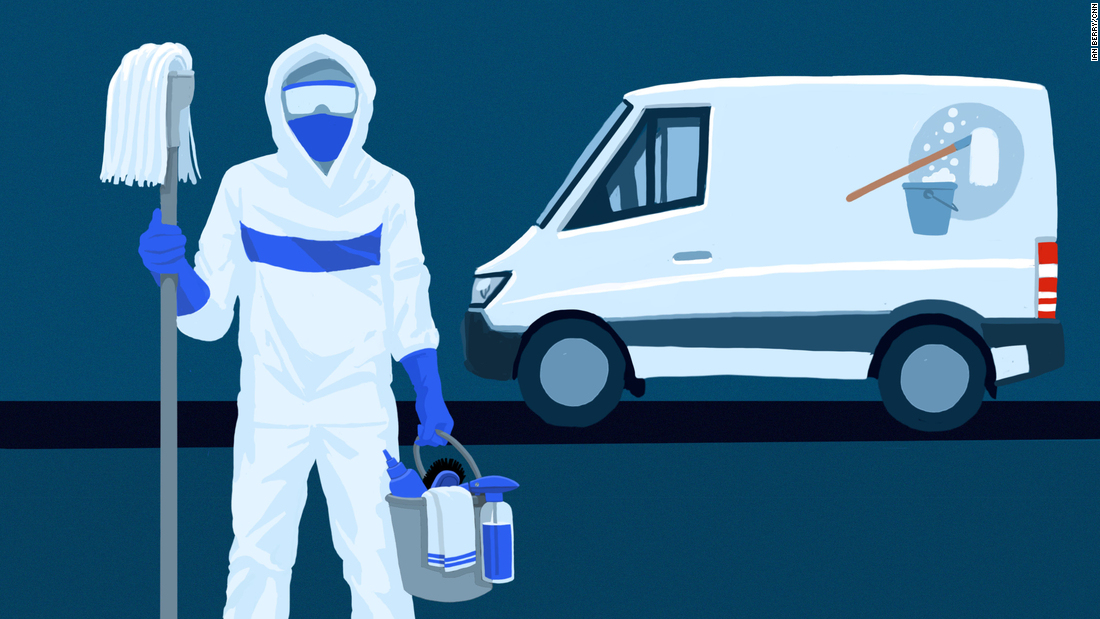
Yet, after months of working from home -- and perhaps teaching and supervising children full-time -- you're faced with dirty floors, broken appliances, and fraying parental nerves. You need help.
From an economic standpoint, that means greater demand for in-home service providers, like house cleaners, plumbers, repairmen, handymen, babysitters and nannies.
But from a health standpoint, the question of how to have someone work in your home safely is now paramount for both you and the service provider.
That's why you should expect to see many changes in protocols for in-home service, some of which are likely to be permanent.
"This will leave a scar in people's memories," said Mike Bidwell, CEO of Neighborly, the parent of home service business brands such as Molly Maid, Mr. Handyman, Mr. Appliance and Glass Doctor.
What to expect when hiring a cleaner, repair person or installer
More PPE and social distancing: Cleaners and repair people are being asked to suit up with masks, gloves, goggles and shoe coverings. And clients may also be asked to wear masks and keep at least six feet apart from any worker in the home.
If a client is in a high-risk category -- e.g., is elderly or has an underlying condition -- the recommendation goes well beyond six feet of distancing, according to Oisin Hanrahan, CEO of Handy.com, which hires out professionals for repair, assembly and installation.
For instance, Hanrahan said, some clients will leave their front door open so the pro can let herself in, and will sequester themselves in another room while the person is working.
Neighborly is advising its franchisees to only have one worker per service vehicle, and to equip that vehicle with wash stations so the service provider doesn't need to use clients' bathrooms.
At Green Clean Maine, a small cleaning company in Portland, Maine, founder Joe Walsh said he now only sends one worker on a job whereas previously he would send two. And he provides returning staff with several hours of training on how to prevent spreading the virus.
More cleaning of equipment: For its cleaning franchises, Neighborly has advised that cleaners use new mop heads for every job and liberally use disinfectant, not only on all surfaces where they've worked but on the tools they've used.
"There's lots of wiping down of equipment between jobs with sanitizer," Bidwell said.
Health status and paid sick leave: Both the client and the service provider will have to be honest with each other about their health status and that of anyone else living in the home before the scheduled date of service.
Walsh, for instance, emails his clients beforehand asking them to please let him know three things: Have you been sick recently? Do you think you've been exposed to coronavirus? And have you traveled out of state?
If you're going to hire someone through a service, ask whether they get paid sick leave. At Handy, for instance, pros will get paid for 14 days if they get sick or are just exposed to the coronavirus. "They're not incentivized to come to work and it discourages them from taking unnecessary risks," Hanrahan said. "It's the right thing to do."
Industry recommended practices: While home service companies are using guidelines from the Centers for Disease Control and Prevention as a starting point for Covid-related safety recommendations, if you're hiring someone from a specific trade, chances are professional associations for that trade also will offer best practices for its members, such as this one for plumbers.
Hiring childcare and eldercare workers requires clear communication
There's no more fraught decision than hiring someone to care for your child or elderly parent during a pandemic.
There's been an uptick in demand for caregivers as people return to work, but schools, daycares and camps remain closed, said Tim Allen, CEO of Care.com.
Social distancing isn't possible with hands-on care, and the new safety rules vary from family to family.
"Within your own home, you can set the rules that make you the most comfortable and limit the risk of exposure, whether that's about frequent hand washing or when to wear masks," Allen said. "We've always recommended that families create a nanny contract to spell everything out -- from salary and hours to PTO and now to hand washing -- and we think it's more important than ever."
But it can't just be a one-sided discussion since the caregiver's health is on the line, too.
"Everybody needs to agree to rules and be accountable to each other," said Christa Nader, a placement counselor with Adventure Nannies. "Everybody is trying to do what is safe. And they're having a hard time."
That's because health guidance and personal choices will change. Sometimes kids will tell nannies that the family had visitors over the weekend, Nader said. And nannies may be uncomfortable with that because it increases their odds of exposure.
Both parties have to be transparent about what makes them feel safe and what doesn't. And it has to be an ongoing conversation. "People's feelings are shifting often," Nader said.
The National Domestic Workers Alliance, meanwhile, offers tips on how to stay safe when providing care in a home and offers sample agreements -- for nannies and house cleaners and their employer -- to spur a discussion about what each can expect from the other during this pandemic.
"come" - Google News
May 29, 2020 at 07:33PM
https://ift.tt/2M7MB7p
Need a plumber or babysitter to come to your home? Here's how to keep everyone safe - CNN
"come" - Google News
https://ift.tt/2S8UtrZ
Shoes Man Tutorial
Pos News Update
Meme Update
Korean Entertainment News
Japan News Update
Bagikan Berita Ini














0 Response to "Need a plumber or babysitter to come to your home? Here's how to keep everyone safe - CNN"
Post a Comment